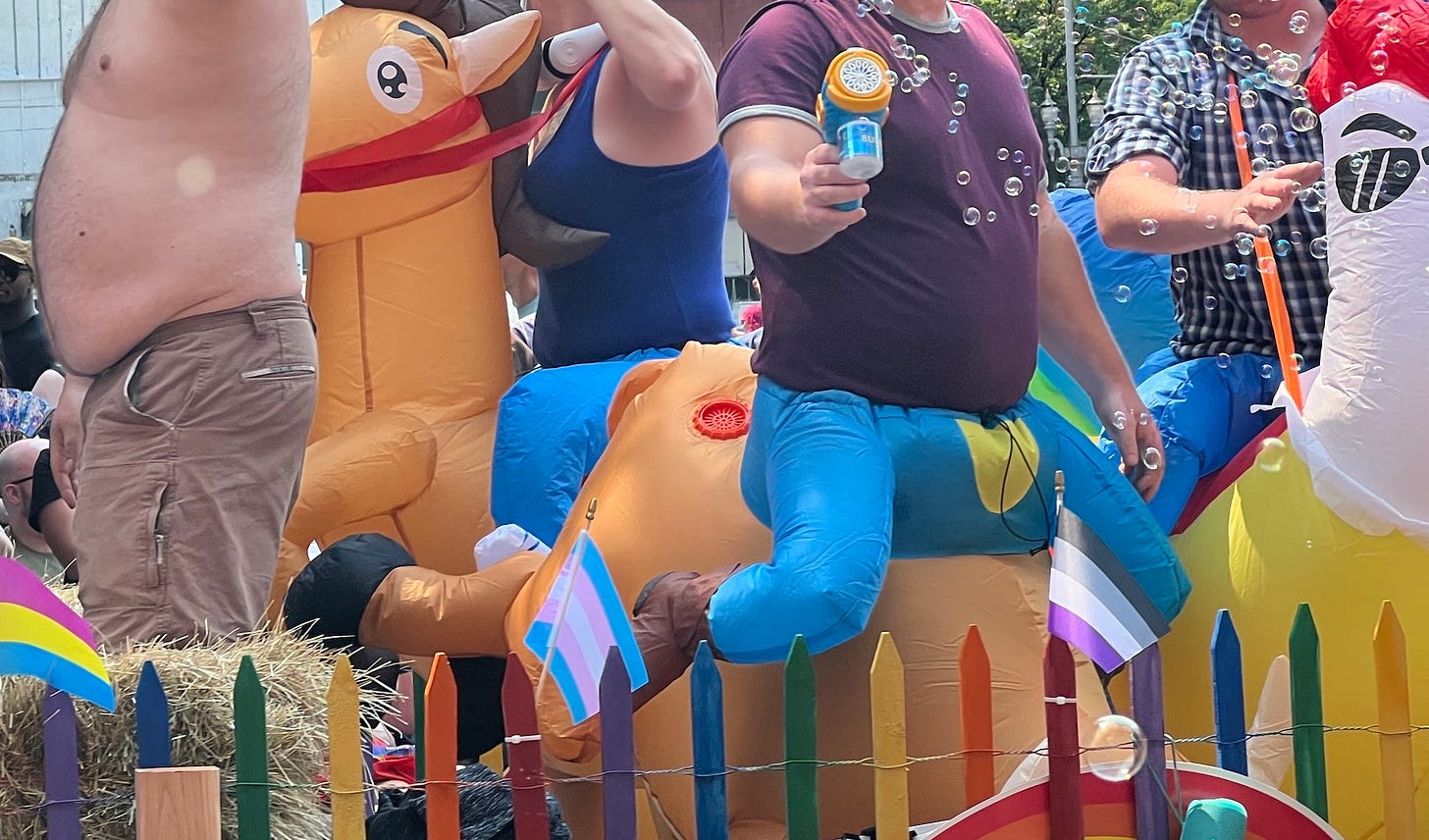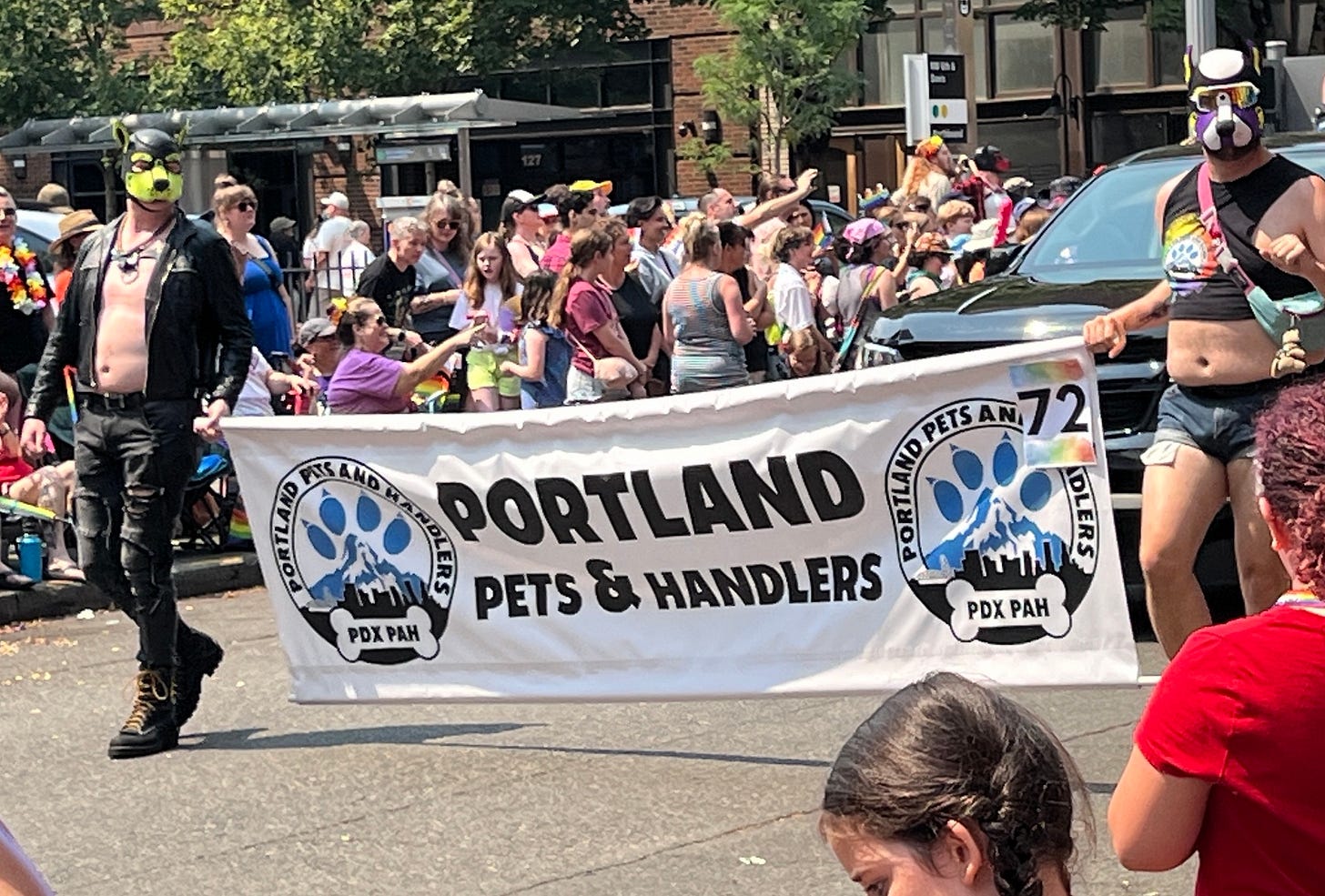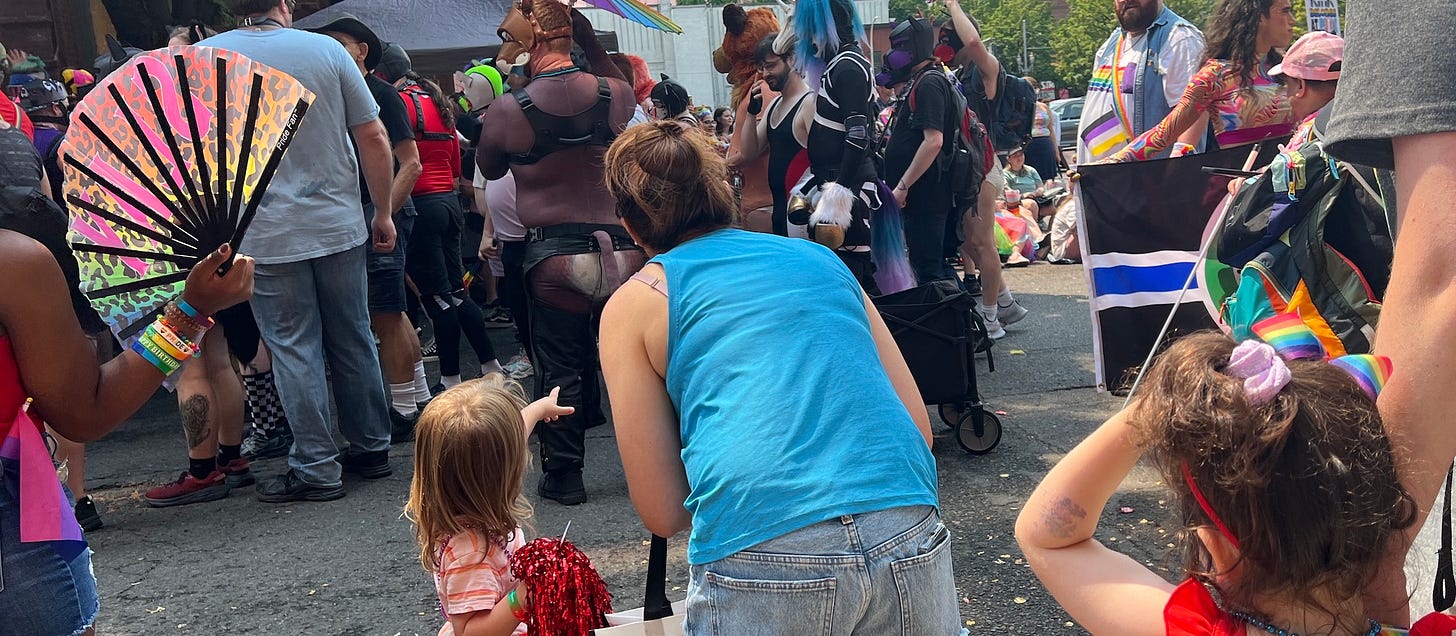The most Portland thing of all at this week’s Pride Parade was the guy in the assless denim overalls. It was the epitome of a queer Pacific Northwest mash-up.
Portland’s Pride Parade was in July this year because, while in the entire known universe all of June has been designated Pride Month, Pride Northwest, out of sheer politeness, and to “avoid overlapping with other significant cultural events in the Rose City,” moved their signature parade to July.
In fact, they moved the 10th annual Portland Trans Pride March into July as well. And last year, the Pride Parade was in July, too. Funny that. Is this evidence of Pride Northwest being polite, or greedy—greedy for more attention, more bandwidth from the citizens of Portland, more money from their corporate sponsors?
I’m going with greedy. Needy, greedy, and shameless1.
Pride insists on its counter-cultural cred while being generic and predictable a majority of the time. The prevailing aesthetic at the parade was, of course, rainbow: rainbow backpacks and bags; shirts and skirts and pants; sneakers and belts and bows and hats. No item is too small for a rainbow. The parade itself was uninspired—no floats, precious little live music, and few elaborate costumes, except of course for the drag queens and the men who think they’re women and the men engaging in public kink (on which, more later). Mostly it was a bunch of corporations and community organizations signaling their allegiance to the cause. Behind the scenes, allegiance was shown with financial contributions. At the parade, allegiance constituted of people co-branded with rainbows and their corporate logos, walking; and trucks, co-branded with rainbows and their corporate logos, driving. Branded, rainbowed trucks, and branded, rainbowed people, sticking it to the establishment.
Who, precisely, is sticking it to the establishment by marching in the Parade?2
Banks and credit unions showed their pride—from Bank of America to U.S. Bank. Delta and Alaska Air were there, as were Marriott, Macy’s, and Daimler Truck. Safeway / Albertson’s brought a truck with a drag queen. Adidas was handing out discount cards to the employee store. Even the Department of Fish & Wildlife felt a need to represent—“Pride in the wild” said their banner, while their truck proclaimed “lamprey are older than dinosaurs!” True, but irrelevant to the theme of the day. That said, lamprey appear to be pentachromats3, able to see color in greater detail than we can, so they might have some aesthetic advice for the rainbow crowd.
The crowd seemed appreciative of all the corporate backing. I heard several attendees murmuring their approval. “Look, OnPoint Credit Union is here—that’s so great.” “Oh Doc Martens—awesome.” “Oh Nordstrom!”
From print shops to pet hospitals to general contractors, no sector of the economy seemed to be missing. Unions marched in the parade alongside utility companies, as well as the United States Postal Service. Representatives from Portland State University marched, as did Oregon Health Sciences University. As, for that matter, did many health care organizations—Kaiser Permanente, Providence, and Randall Children’s Hospital among them. A children’s hospital.
Speaking of which, KinderCare was also there. KinderCare offers daycare for children ages six weeks through kindergarten, as well as after-school care for the olders. I’ll give them this: They know their audience. There were many small children in attendance, standing on the parade route waving flags, being pushed in strollers through the crowd. They, too, were bedecked in rainbows.
Most of the corporate sponsors handed out swag: little flags, lollipops, bottles of bubbles. I went to Pride and all I got was a lousy keychain that says “Vote Love.” I don’t even know who made it, or who they want me to vote for. I suspect that my idea of “voting love,” and theirs, will be radically different.
During the Summer of 2020, when madness was allowed to run wild in many American cities, and achieved fever pitch in Portland, many storefronts erected what I dubbed “don’t hurt me” walls. In an often fruitless effort to be spared the vandalism that erupted every night in some parts of the city, store owners would publicize their fealty to the cause. Black Lives Matter posters were nearly ubiquitous. More niche messaging included “amplify melanated voices” and “defund + demilitarize + dismantle police.”4
In his 1978 essay The Power of the Powerless, Václav Havel wrote of a fictional greengrocer who posts a flyer in his window that reads “Workers of the world, unite!”. Havel asks—"why does he do it? What is he trying to communicate to the world?” Havel answers:
“I, the greengrocer, live here and I know what I must do. I behave in the manner expected of me. I can be depended upon and am beyond reproach. I am obedient and therefore I have the right to be left in peace.”
Pride Northwest has effectively compelled a large fraction of the companies that do business in the city to ante up if they hope to be left in peace. Pride Northwest has turned the businesses of Portland into Havel’s hapless green grocer. They have created a Don’t Hurt Me parade.
In some ways, the parade seemed like Latin American Carnaval, but with little of the creativity or authenticity.5 There were surprises for the eyes around every corner, but it was pretty much all of a type. There was the guy in skivvies who thought he was a woman. Actually, there were several of those. There were people wearing Covid-era masks—because respiratory viruses are an existential threat to people outdoors, but cross-sex hormones and surgical mutilation for people too young to vote is a birthright. There was a guy wearing a peacock tail and skirt, another in royal purple regalia complete with crown, and several people in stripey knee socks.
Some people waved Palestinian flags, and one woman carried a “Dykes for Palestine” sign. “Queer Pagans Unite,” read another sign. Another: “If your reading this ur gay.”
The Portland Trans-Fem*s were there, carrying a banner directing interested parties to their Discord server.And a very earnest young man was handing out flyers for the Class Struggle Action Network, which, according to their literature, advocates for such things as “eliminating pay differentials based on category” and eradicating the “capitalist profit system.” They’re going to be about as successful as the men who think they can magically turn into women.
One thing I didn’t see at Pride were zombies. The zombies of Portland—and of many American cities now—are the walking dead, their eyes blank, their bodies twisted and hunched, eager for their next fix. Fentanyl leaves husks of people lying in the street, pants around their ankles; it leaves people hanging out the passenger side of rusty cars, crumpled at the curb; and it leaves the most functional of its victims vacant but ambulatory. There were no zombies at Pride. Pride takes its victims a different way entirely.
One of the entities in the parade was “Portland Pets & Handlers.” Listed cryptically in the official parade contingent lineup as PDX PAH, this group comprised doughy men in dog masks and tails, or dressed as other unspecified “pets,” prancing and holding their hands up and their wrists limp in weak imitation of paws. Some among the attendees were also wearing leather dog masks, or tails, or were even more suited up than that. One of the “handlers” wore a gauzy white skirt and held the reins of the “pet,” who was dressed scantily in leather and had a bit in his mouth, ‘cause that’s what pets like.
When the “Pets & Handlers” group came through, I was standing behind a couple of moms and their pre-school-aged children. One of the girls was asking to go—kids get antsy, after all—but her mother insisted they stay. “Look!” the mom pointed at the PAH group as it approached. The little girl seemed, by her body language, dubious. Then curious. Finally, riveted. Once the leather straps and bare skin and dog masks and reins and bits and tails were in front of her, she could not look away. Both mothers laughed, apparently delighted, as bondage-dressed middle-aged men gyrated feet from their daughters. It was, after all, a beautiful day, and they were out with their children, enjoying the view. What’s not to be delighted about?
The Portland Gay Men’s Choir was also at the parade. Their voices are beautiful. They, along with a smattering of parade attendees, looked like gay men from an earlier time. Fit and trim, mustachioed or clean-shaven, and uniformly good looking, these men also seemed to be under no illusion about who and what they were.
They were fabulous. They seemed to come from an era in which gay men and lesbians were striving for acceptance—to live their lives unaccosted, and have the same legal rights as heterosexual couples. In L.A. in the 1970s and 1980s, where and when I grew up, my mother had several artist friends who were gay. David and Richard were the ones who became most familiar in our home. In those days they couldn’t get married, but they were loyal to one another. Family lore suggests that before they came over to our house the first time, my little brother—inquisitive and socially fearless—had some questions about what it meant that two men were in love with one another, but he kept the questions to himself until they arrived. Maybe four years old, my brother marched up to David before he had even received his first drink and asked, in a clear and ringing voice,
“Do you have a penis?”
My mother was mortified, but our guests were not. David laughed.
“Yes young man, I do have a penis,” he answered my brother. And that was it. My brother had asked a simple question, and received a simple answer. There was nothing predatory in the answer, no desire to instruct a child in the ways of homosexuality, or indeed, in the ways of sexuality of any sort. If there had been, of course, my parents would never again have invited those guests into our home. Because protecting children is one of the crucial roles of parents.
Or at least, it used to be.
This is not the place for a deep analysis of Pride Northwest, but I will say that it has several sketchy claims on its website, including that “the houseless LGBTQIA+ youth population is currently at 40%.” It’s not even clear what the claim is—that 40% of LGBTQIA+ youth are homeless, or that 40% of homeless youth are LGBTQIA+? Either way, I don’t buy it, unless you include “I once questioned my sexuality” in the ever-broadening category of LGBTQIA+, which makes the claim (whichever one they mean) both meaningless and manipulative.
Entity names that are hot linked go to the particular pride initiative that was being advertised at the parade. I generated my list in real time; here is the official and presumably complete list of entities that marched in the parade, as published by Pride Northwest.
Collin 2009. Early evolution of vertebrate photoreception: lessons from lampreys and lungfishes. Integrative Zoology 4(1): 87-98.
I showed some of these signs and flyers in DarkHorse livestreams #25, 35, and 77.
The men who think they are women, and the people literally parading their kinks, are yelling about being their authentic selves, but delusion and kink being publicly exhibited seems less authentic than exhibitionist. What passes for “authentic” at Pride feels, by turns, generic and corporate (see: paper rainbow Kroger-branded crowns worn by many in the crowd), and like fetish that has no place in public. Some will argue that exhibitionism is them being their authentic self. But civilization does not mean tolerance for every single urge that people have; indeed, one of the roles of society is to rein in some of those urges. Universal tolerance is anarchy.













I'm a 70yo gay man. I remember what it was like before the Stonewall riots. Gay men were treated like criminals and nearly no effort was put into policing the predators that preyed on the gay community until a body was found the next day. The prevailing opinion among law enforcement was that we largely brought the predations on ourselves with our perversions. All any of us ever wanted was to be treated like every other citizen entitled to the same minimalist protection from law enforcement. A lot of us old heads were offended by the demands for celebration and completely mystified by the transgender movement. "We never marched for tranny rights" is a common refrain in MY community.
"Universal tolerance is anarchy."
Wow. Nailed it.
When the history of the fall of the West is written (but who will be left to write it?), that sentence will be key.